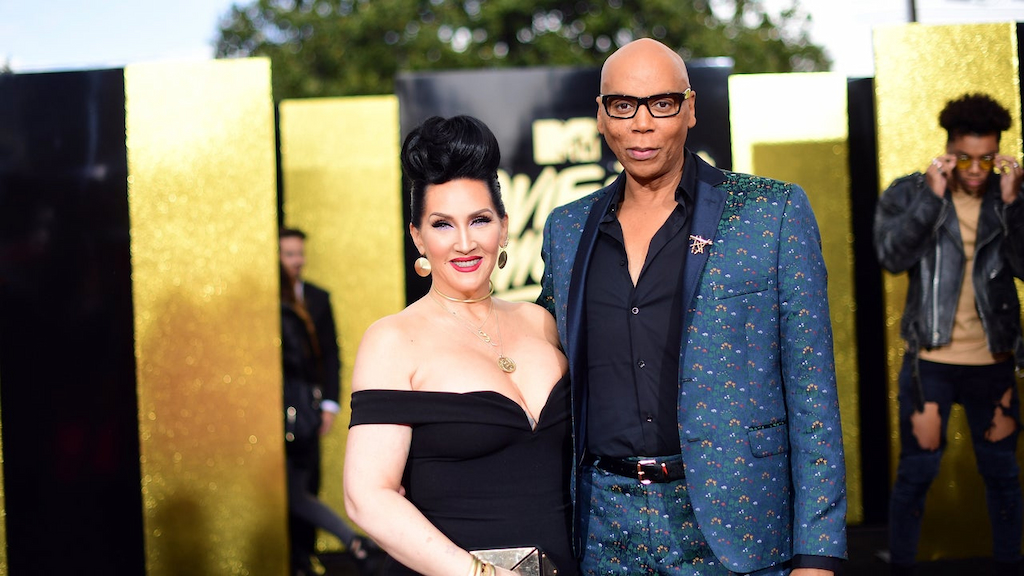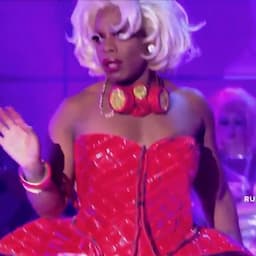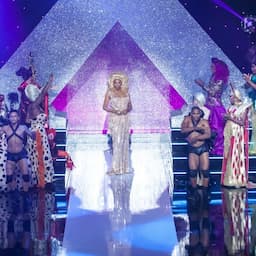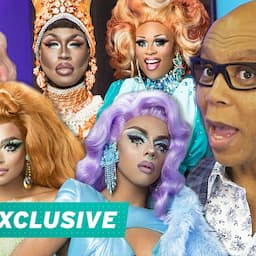The longtime judge hopes Television Academy members consider the full reach of the series when they cast their Emmy votes this year.
RuPaul’s Drag Race is changing lives, and not just those of the contestants.
"One hundred percent,” longtime judge Michelle Visage tells ET. “That sounds so dramatic, but it’s so true. Ru says it best. He says, ‘RuPaul’s Drag Race brings families together,’ and that is 100 percent church. Like, it is so true, because I’ve seen it.”
Visage joined the show in its third season, but has been part of RuPaul’s universe since the late 1980s. The pair have worked together professionally, on and off, since the late 1990s, giving her a front-row seat to watch that change unfold.
“I’ve seen that shift and that shift is very powerful, because the younger generation are the ones that love our show,” she continues. “These are kids, whether they’re cisgender girls, heteronormative girls, whether they’re queer kids, trans kids, whatever, they’re finding a place where they feel validated and feel loved and feel like they have a place to fit in.”
Visage says, thanks to the Emmy-nominated show, she’s become an unintentional guiding light to kids who don’t feel like they fit into “mainstream society,” and to the parents who don’t understand why their kids don’t fit in.
“I feel like that’s my ultimate work with this show, [to] be a mother to the kids who don’t have it … but more importantly, be a friend to the parents who are kind of lost,” she shares.
The TV personality, who has two daughters of her own, says her inbox is regularly flooded with messages from kids and parents alike seeking guidance.
“I always tell the parents, 'You don’t have to approve of your children, you just have to accept them for who they are,'” the 49-year-old shares. “When they think about it that way, they go, ‘Oh. OK. I just have to accept my gay kid. I don’t have to approve of what they do, ‘cause I’m never going to approve. But if I accept who they are, maybe that’s a good first step into your relationship repairing.’”
“So, though I did not plan on becoming any kind of a therapist, for lack of a better term, because I’m not that equipped -- I’m only equipped as the voice of an ally,” Visage continues. “When you break it down, it just has nothing to do with you, [the parent]. You need to pull your ego and yourself out of it, and then they go, ‘Oh my god. You’re right. This isn’t about me.’ You created this child, you didn’t create their gayness.”
Visage credits the VH1 series with opening the door to these tough but essential conversations, and giving families something to bond over, which you can see for yourself at any of the live shows the casts of the series do after their seasons air.
“We’re in theaters, 3,000-seat theaters, that are sold out a few nights in a row, and it’s not just the boys [anymore],” Visage notes. “It’s older men, it’s mothers and fathers and kids. It’s fathers with their kids, it’s mothers with the kids. It’s heterosexual, heteronormative couples that love the show and love the art of the drag, because it’s always been an art form to me, but it’s never been recognized as such, and now it finally is being recognized as a viable art form.”
With the show’s move from Logo to VH1 last year, a slew of new viewers have found the series and latched onto it. The new network is cranking out more seasons of the series faster -- an 11th regular installment and a fourth version of the All Stars edition are already in the can -- but Visage doesn’t predict Drag Race fatigue anytime soon.
“Listen, there’s an expiration date for everything, but I mean, we’re not burning out on Top Models, are we?” she asks. “We’re not burning out on making things in a Runway room, are we? We’re not getting enough Got Talent, right? We’ll never run out of talent. So, how could there be a Drag burnout?”
“There’s more drag now more than ever, not because they haven’t -- not because it’s not out there,” she says. “It’s because there’s more and more kids being moved and swayed and urged into this art of drag. It’s their calling. I don’t think there can be burnout, because we aren’t on every channel. Because we aren’t everywhere.”
Visage praises VH1 as “smart” for committing to more Drag Race and not trying to flood its schedule with other drag programming.
“People want RuPaul,” she proclaims. “Let’s not forget. There have always been drag queens everywhere … There’s only one RuPaul. That’s why when people try to do other things, it ain’t gonna work. We’ve got the secret weapon. It’s RuPaul! It won’t work with anybody else and there’s great drag talent out there. It’ll never work. There’s only RuPaul.”
RuPaul’s Drag Race nabbed 12 Emmy nominations this year, including one for Outstanding Reality-Competition Program for the second year in a row.
“Let’s be honest, I thought last year was [our year],” Visage admits. “So, as I sat there with my breath held, and they called out The Voice, I quickly learned, oh, OK, I guess this isn’t our year. But you know, it’s funny, they do say the honor is really in the nomination, and until you are nominated, you don’t appreciate how very valid, and how very true, that statement is.”
“So, with that said and done, we are so grateful for the nomination,” she adds, “but I feel like, this year, as we’ve progressed as a society, as we’ve progressed as a nation under very horrible leadership, this year, now more than ever, not only is it necessary to make this statement, but important.”
Visage hopes the power of RuPaul's Drag Race outside the screen is what the Television Academy members take into consideration this year as they cast their votes.
“This show is so much more than boys dressing up in girls' clothing,” she says. “This show is about heart, and the tenacity of the spirit, and love and grit, and what to do in the face of adversity, because 99 percent, maybe 98 percent of the contestants, have had some kind of adversity that no human being should ever have to face in a lifetime. That’s really what this show is about, and that’s why, if we won, the message would be so great and so loud.”
RELATED CONTENT:



